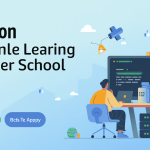
If you’re someone who wants to learn how to create websites from scratch, this free course from the University of Michigan might be perfect for you. Offered through Coursera, the “Web Design for Everybody: Basics of Web Development & Coding” specialization helps beginners understand the core building blocks of the web – HTML, CSS, and JavaScript. You don’t need any previous coding experience to get started.
Let’s explore what this course offers, who can join, and how it can help shape your future in tech.
The specialization is made up of five beginner-level courses. Each one teaches practical web development skills, starting with the basics and moving toward real-world web design projects.
Here’s a quick breakdown of what you’ll learn:
You’ll also become familiar with tools like browser developer tools, wireframing techniques, and best practices in user-friendly web design.
This course is designed for complete beginners. Whether you’re a student, working professional, or just someone curious about web development, you can take this course without any background in coding.
There’s no age limit or educational requirement – just a willingness to learn.
Each course in the specialization can be taken at your own pace, and you can pause or restart whenever needed.
Yes. After completing all five courses and the final project, you will receive a career certificate from the University of Michigan via Coursera.
In today’s digital age, knowing how to build websites is a powerful skill. Here’s how this course can benefit your career:
It’s also a great stepping stone for more advanced programming courses later on.
Follow these easy steps to join the course:
Here are some tips to help you stay on track:

Content Strategist & Career Researcher
Haris is a Content Strategist and Career Researcher at Talentd, specializing in job market trends, career development, and placement preparation. With years of experience guiding students and professionals from Tier 2 and Tier 3 cities, he crafts practical, research-backed content that helps users succeed in competitive hiring landscapes.

Introduction Data engineering has become one of the most in-demand skills in today’s digital world. Every organization, from startups to multinational corporations, relies on data to make smart decisions. But before data can be analyzed, it needs to be collected, cleaned, stored, and made accessible — and that’s where data engineers come in. Dell Technologies, […]

IBM, a global leader in technology and innovation, is offering free online AI courses with certificates for learners around the world. Whether you are a student, job seeker, or working professional, you can now start learning Artificial Intelligence from scratch and earn industry-recognized credentials — all at your own pace and without paying a fee. […]

Amazon’s Machine Learning Summer School 2025 is an excellent opportunity for students in India to gain hands-on knowledge and foundational understanding of core ML concepts. This fully virtual program is designed to help students build a strong ML skillset, learn from leading scientists at Amazon, and prepare for a career in Machine Learning and Artificial […]